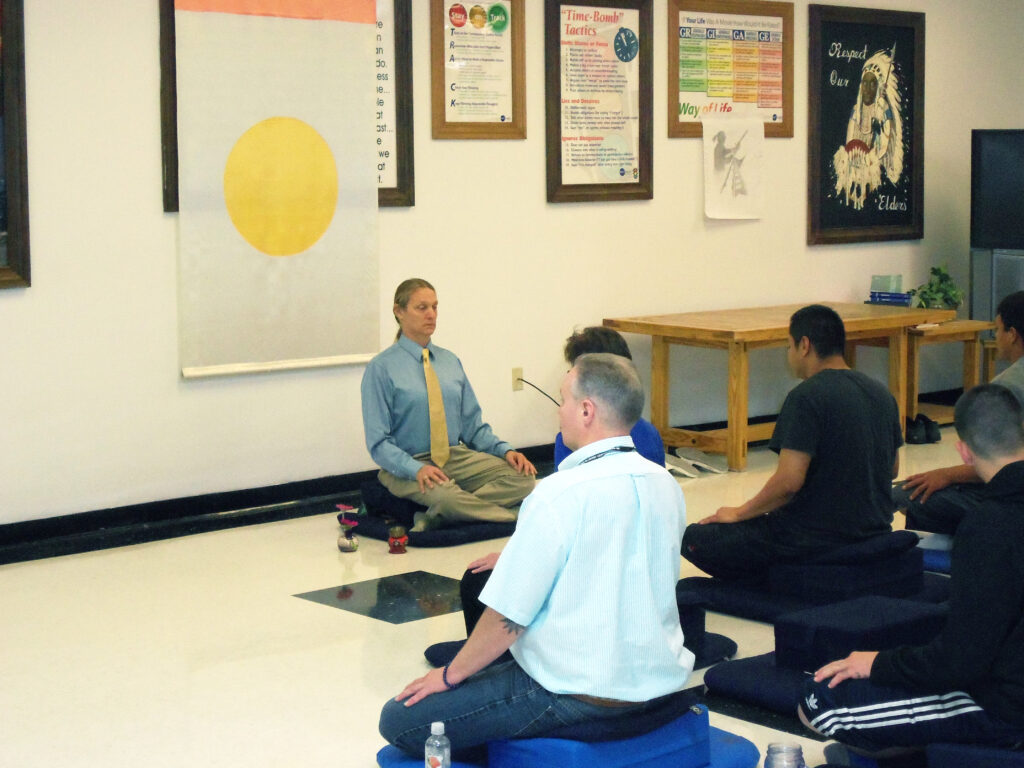
Gary Allen at Limon Correctional Facility, Limon, Colorado
SOME THOUGHTS ON PRISON AS SPIRITUAL PATH
by Gary Allen
I first entered a prison in 1990. Back then I was an M.F.A. student in Writing and Poetics at Naropa University. That semester the department offered a one credit course designed to get students teaching creative writing outside the academy grounds, and our teacher arranged for us to lead a two day creative writing program at the Colorado Territorial Correctional Facility in Cañon City, the oldest prison in Colorado.
I remember coming up to the control room for the first time where you passed through the metal detector. The control room window was peppered with holes (as a matter of fact, I think it still is, some 34 years later), clearly from getting blasted with a shot gun. I didn’t know what to expect from such a place, and I probably would never have tried to go into it without having my hand held, so to speak.
But then I was in a room with a bunch of guys starting to talk about writing and poetry. About 45 minutes in it dawned on me: whatever they had done, whoever they had harmed, whatever crap had gone down, they were still a bunch of guys sitting in a room – i.e., they were human beings. I relaxed. I knew how to relate to human beings. If I had some big idea in my mind about them being dangerous criminals, it was going to be a lot harder to talk to them about poetry…or about anything.
Another thing I got during that first experience: to write creatively, to think about that and share yourself that way, lifted you up as a human being. In a environment that tends to degrade one’s humanity, to be taken seriously for your ability to express deeper feelings and insights, and do it in a more refined way, automatically raises you up and restores you to something important about yourself.
I continued to visit prisons to teach creative writing for a while, but by a few months later I’d started to teach them meditation. While I still see great value in prisoners developing creative writing skills, meditation seemed more to the point. This way you could go directly to your mind, which was the source, after all, of a whole lot of pain and confusion, and why you might wind up behind the high cement walls of Colorado Territorial.
 That’s the thing about prison. For all the many ways it might inhibit spiritual practice, from living in close quarters with sociopaths to simply not having dharma books in the library, it can accomplish one very important spiritual task: it devastates your normal sense of yourself and faces you with the distinct possibility that you’ve failed utterly in your life. For a lot of people who wind up in prison, how they engaged with their lives has led them to doing 8 to10 in a world where they circumscribe everything and tell you what to do and where to be all day long. You used your freedom in such a way as to now sleep in an impossibly noisy, not to say, dangerous dorm with 70 other dudes. Frequently, you’ve lost all your money and resources, and sometimes you lose the support of your family as well, who shuns you.
That’s the thing about prison. For all the many ways it might inhibit spiritual practice, from living in close quarters with sociopaths to simply not having dharma books in the library, it can accomplish one very important spiritual task: it devastates your normal sense of yourself and faces you with the distinct possibility that you’ve failed utterly in your life. For a lot of people who wind up in prison, how they engaged with their lives has led them to doing 8 to10 in a world where they circumscribe everything and tell you what to do and where to be all day long. You used your freedom in such a way as to now sleep in an impossibly noisy, not to say, dangerous dorm with 70 other dudes. Frequently, you’ve lost all your money and resources, and sometimes you lose the support of your family as well, who shuns you.
Not that this outcome makes a dent in a lot of felons who are so deep in their ego trips that prison only makes them meaner and more manipulative. But when you’re finally exhausted with it all and know in your heart of hearts how you’ve lived was wrong, and what you thought and believed was senseless and disastrous, then some openness to approaching it all in some other way starts to seep light into your darkness.
Then you might be able to hear the dharma (or any other spiritual teaching or psychological analysis) and feel it resonate. You might even find a way to meditate in that loud, obnoxious dorm, dealing with your thoughts and emotions, and for the first time really taking a look inside yourself. I know that it can be done because people all over the United States (and sometimes from overseas) write us and describe it.
The very hardness of the circumstance drives the path – at least it does if it you’re doing it right.
But here’s the other angle on “prison as spiritual path,” as I’m personally now moving into four decades of bringing dharma into prisons. It has been a path for me as well. I show up at my desk Monday through Friday to pursue it, and I do long drives across flat stretches of Colorado to prison facilities to bring it in person. While I’m not alone in this avocation, and others commit to sharing what they know with inmates, overall it’s not a popular thing to do among average American citizens.
Nevertheless, I have some thoughts on the topic, and I’ll be sharing them in this space.